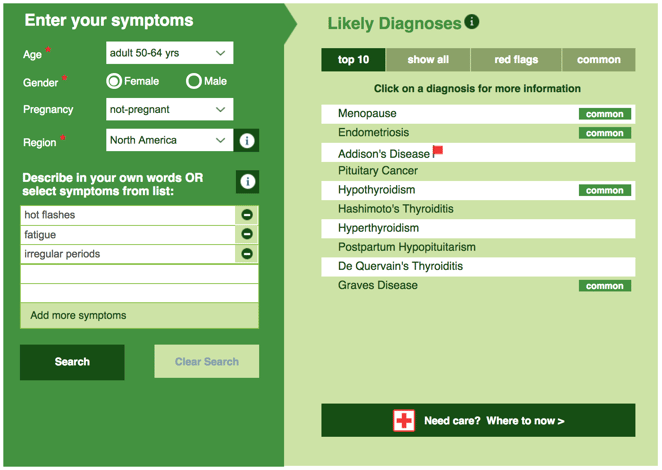- Privacy Policy
- Terms & Conditions
- Contact us
- ©Isabel Healthcare 2025
Am I going through menopause? Symptom checker for menopause
Menopause is the permanent end of the menstrual period cycle and therefore the end of the fertility period in a woman. In this blogpost we talk about what to expect during this time in your life, the different stages of menopause, and advice on how to deal with the changing symptoms.
Menopause is officially diagnosed after you have gone for 12 months without a menstrual period. Currently in the USA, the average age for menopause is 52 years, but anywhere between age 40 to 55 is considered normal. Factors such as smoking, living at high altitude and undernutrition may lower the age. Premature menopause is diagnosed if it occurs before the age of 40, and after the age of 55 it is known as late onset menopause.
The stages of menopause
Before you are diagnosed as having entered menopause you will go through two earlier stages which determine if you are leading up to the menopause.
Peri-menopause
This is defined as the time leading up to the menopause, when your body begins to slow down estrogen production, and this comes with many symptoms, some of which you may have heard of. The actual length of peri-menopause varies greatly, and can go on for several years leading up to the end of your periods and therefore menopause.
Menopausal transition
Within peri-menopause, you will go through a menopausal transition, where the hormone levels which your ovaries are producing fluctuates. Biologically, as woman goes through the peri-menopause the hormone levels of estrogen and progesterone fluctuate widely which is thought to cause the hot flashes and some of the other symptoms. As the hormone levels decline, so does ovulation as the ovaries run out of viable eggs and consequently the changes in the menstrual cycle are seen. This causes irregular periods, along with other symptoms, and these changing menstrual patterns are often a good indication that you are heading towards the menopause.
Symptoms of menopause
Hot flashes or hot flushes
Hot flashes are one of the most common symptoms and affect 75% to 85% of women. They usually begin before periods stop, in the peri-menopausal stage, and many women have them for more than a year in duration. They will become milder and less frequent as you progress through the peri-menopause. During a hot flash, blood vessels in the skin surface widen and blood flow increases to the skin, especially around the head and neck area which become red and warm with a flushed appearance. The woman feels warm or hot and perspiration may be profuse. They can last from 30 seconds to 5 minutes and may be followed by chills. Hot flashes which occur at night are called night sweats.
Irregular periods
Skipping periods during the peri-menopause is common, and often periods will skip a month and then return, or they may skip several months and then reoccur for a couple of months. Periods also tend to occur on a shorter cycle, so you may have a few which are very close together. This phase can last a few months or a few years, and eventually your periods will stop altogether. Then, once you have had no menstrual period for at least a year, your doctor will be able to diagnose you as having entered the menopause.
During the months or years of the peri-menopause phase, the following symptoms may also occur. They can be mild, moderate or severe:
- irregular periods
- vaginal dryness
- hot flashes/hot flushes
- loss of concentration
- headache
- fatigue
- chills
- night sweats
- sleep problems
- mood changes – irritability, anxiety and depression
- pain during sexual intercourse
- urinary urgency
- weight gain and slowing of metabolism
- thinning hair
- dry skin
- loss of breast fullness.
Symptom duration varies greatly from woman to woman and may last six months or could go on for up to 10 years before the menopause actually occurs.
Peri-menopause symptoms – Isabel Symptom Checker
Can I get pregnant during menopause?
It is still possible to become pregnant during the peri-menopausal period. You should continue with contraceptive use until you have been diagnosed as having entered the menopause. Consequently, if you miss a period and are not sure whether you are in the peri-menopausal period or if there is a chance you could be pregnant, you should consider a pregnancy test.
Other causes of menopause
In most cases the menopause occurs in women over 40, and is to be expected and not cause alarm. In some cases however, menopause can occur for different reasons.
Premature menopause
Menopause can occur before age 40 in 1% of women. This is known as primary ovarian insufficiency or premature menopause and is caused by the ovaries not producing normal reproductive hormones due to genetic or autoimmune disease. For women diagnosed with primary ovarian insufficiency, hormone therapy is recommended to protect the brain, heart and bones until the natural age of menopause is reached around age 50.
Hysterectomies
A woman entering the menopause can be caused by a surgical condition called a hysterectomy, where some or all of the reproductive organs have to be removed. If the hysterectomy removes both your uterus and ovaries, known as total hysterectomy and bilateral oophorectomy, then this will cause an immediate menopause. Symptoms of menopause, including hot flashes, may be severe. If the uterus is removed but the ovaries remain you will no longer have monthly periods but will have ovaries releasing the estrogen and progesterone hormones so other symptoms may still occur for a certain time period.
Cancer treatments
Other medical causes of menopause can include those receiving chemotherapy or radiation treatment for cancer, which can mean the woman enters early menopause. Menstruation and fertility may or may not return when treatment is finished, so birth control methods should be considered at this point.
Next Steps
Menopause requires no medical treatment. Treatments are aimed at reducing and managing symptoms you are experiencing. For instance, hormone replacement therapy may be recommended if you are unable to manage hot flashes etc. If you are found to be at risk for osteoporosis, then you may be prescribed Vitamin D medication and other treatments to reduce bone loss and the risk of fractures.
There are many things you can do which do not require medical intervention to help treat your symptoms including:
- Reduce effects of hot flashes by wearing layers which can easily be removed when hot, drink plenty of water, avoid food triggers such as hot beverages, spicy food, hot weather and a warm house.
- Decrease vaginal discomfort with over the counter lubricants
- Strengthen your pelvic floor with Kegel exercises to prevent urinary incontinence
- Exercise regularly
- Get plenty of sleep
- Quit smoking, or continue not to smoke
Talking to your doctor about menopause
However old you are, or whatever your circumstances, if you are concerned about your menstrual cycle or think you may be experiencing symptoms of the peri-menopause and are worried, you should talk to your doctor. Before your consultation with you doctor, think about the following questions they may ask you:
- When was your last period?
- Are you sexually active or could you be pregnant?
- Do you use contraception/birth control?
- What are your symptoms and how often do you experience them?
- Does anything improve or make your symptoms worse?
- How often and what type of exercise do you do?
- Do you have any other medical conditions
Another good idea is to keep a menstrual diary documenting your menstruation cycle, how long a period is, how frequently or infrequently your periods occur, what the color of the menstrual bleeding is and how thin or thick it is. Placing any symptoms you are experiencing into the Isabel Symptom Checker and discussing the results with your doctor will also help you both rule out anything more sinister and determine the cause of your symptoms.
Peri-menopausal symptoms vary from woman to woman but can take up a long period in a woman’s life before they resolve. This can be a very challenging part of the aging process especially as other disorders can be developing at the same time. Know your symptoms and what is normal, and this will help you manage this period in your life. You can access our free Isabel Symptom Checker below:

Mandy Tomlinson
Mandy has worked for Isabel Healthcare since 2000. Prior to this, she was a Senior Staff Nurse on the Pediatric Infectious disease ward and high dependency unit at one of London's top hospitals, St Mary’s in Paddington which is part of Imperial College Healthcare NHS Trust. Her experience in the healthcare industry for the past 33 years in both the UK and USA means she's a vital resource for our organization. Mandy currently lives and works in Scottsdale, Arizona.
Subscribe Here!
Recent Posts
Isabel DDx Companion with ChatGPT Integration - to help you diagnose even faster
At Isabel Healthcare, we’ve always been driven by one goal: to make clinical reasoning faster,..Virtual Triage: Do more questions lead to better patient outcomes?
One of the common misconceptions related to virtual triage / symptom checker tools is that the more..List Of Categories
- Differential Diagnosis Decision Support
- Differential diagnosis
- Symptom Checker
- Symptoms
- Medical Error
- Patient Disease Information
- Disease
- Clinical Decision Support
- Diagnostic Decision Support
- Isabel 1 Minute Read
- Diagnosis Error
- Diagnosis Skills Cases
- Healthcare Informatics
- Clinical Reasoning
- Evidence-based Medicine
- Medical Education
- Patient Engagement
- Symptom Triage
- Nurse Practitioner Education
- Nursing Decision Support
- Partnership
- Public Health
- COVID-19
- EHR
- Patient Empowerment
- Patient Safety
- rare disease

Start your FREE Trial today
Try the Isabel Pro DDx generator for 30-days - no payment card details required.





